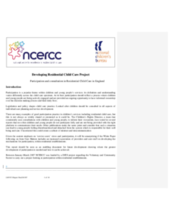There are many examples of good participation practices in children‘s services (including residential care), but these are not always widely shared or promoted. Children and young people too often lack the right platform, opportunity, and support necessary to communicate their needs. This can lead to young people feeling disenfranchised and detached from the system responsible for their well being and care. Uncorrected, poor participation could engender a culture of mistrust and miscommunication.
This report aims to provide insight into children’s perceptions of participation within England’s residential care system, and to note any potential or perceived barriers to participation. It seeks to highlight where there is need for improvement and to help develop participation in residential care. This will be achieved ultimately through the development of a practical and accessible guide, which will include information gathered from the consultations with children and young people, key workers and residential managers. The guide will also include policies and good practice examples.
Analysis reflected a wide diversity of children’s responses to questions regarding their involvement in care planning, responsibilities, social interactions, and life-skills development. Many children reported poor outcomes across these domains, suggesting a pressing need for communication between the children and their caregivers. Participation (and methods of participation) play a key role. The varied responses further highlighted the need for improved consistency and adherence to relevant National Minimum Standards.
In addition, the author noted specific instances where National Minimum Standards failed to facilitate appropriate means for eliciting child participation. The paper also speaks to the activities of caregivers and managers in the residential setting, providing a list of Top Ten Tips for Participation in the conclusion of the document.
©National Centre for Excellence in Residential Child Care

